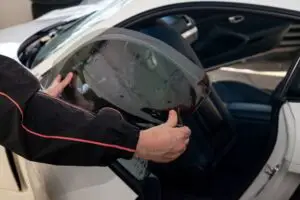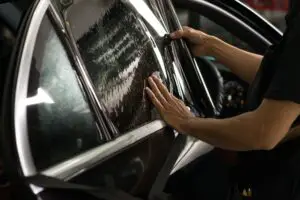Automobiles with tinted windows may appear to be more upscale. However, you must know that this is not a smart choice if you reside in Kentucky.
Kentucky tint rules prevent you from using tint film on your windows whenever you wish.
Still, what exactly do the laws in the state of Kentucky State? That’s what we will be talking about in this article.
Kentucky window tint laws are said to be different for every vehicle type.
You must use a non reflective tint for your windshield, the front seat side windows should be above 35% and the back seat windows and rear windows should be above 8%.
It is also worth mentioning that the rules and regulations for the passengers as well as multipurpose vehicles, you are obliged to follow separate rules.
Now, if you are planning to tint your vehicle, then it will be best for you to read this article all the way through.
Other than that, I have also included some additional rules and regulations and a frequently asked questions section which will help you have a much better understanding of Kentucky laws.
Table of Contents
- 1 How Much Tint Darkness Is Legal In Kentucky?
- 2 Window Tint Reflection And Tint Colors
- 3 Medical Exemption Of Window Tint Laws In Kentucky
- 4 Get A Certified Sticker From The Company
- 5 Other Window Tint Law Rules And Regulations In Kentucky
- 6 Cost Of Car Window Tint In Kentucky
- 7 Frequently Asked Questions
- 8 Conclusion
How Much Tint Darkness Is Legal In Kentucky?

The percentage of observable light that will pass through the vehicle’s window is measured by the VLT, also known as Visible Light Transmission.
The window tint is said to become darker as the VLT falls. Furthermore, a greater VLT indicates that extra light will easily pass through the windows.
Now I will be discussing in detail the visible light transmission for SUVs, vans, and sedans so you can have a clear idea of how much tint darkness should be allowed.
So without further ado, let’s get into it!
Tint Darkness Limit For SUVs And Vans
Starting with the tint darkness limit for SUVs and vans, you must make sure that the windshield of your car must use a non-reflective tint that should be more than the manufacturer’s AS-1 line.
Besides that, the front seat side windows of the vehicle should be above 35 percent visible light transmission.
Lastly, moving on to the back seat side windows and rear windows, make sure that around 8 percent of light is passing through and inside the vehicle.
Tint Darkness Limit For Sedans
When it comes to the tint darkness limit for sedans in Kentucky, keep in mind that it differs from the tint darkness limit for SUVs and vans, so be sure to obey the guidelines.
1. Front Windshield
The front windshield of the sedans should use a non-reflective tint which should be a lot more than the manufacturer’s AS-1 line.
2. Front Seat Side Windows
The front-seat side windows of the sedans should allow more than 35 percent light inside the vehicle.
3. Rear Window
The rear windows of your sedan should let more than 8 percent of light inside the vehicle.
4. Back Seat Side Windows
The back seat side windows of the sedans are the same as the rear windows, and they should also be more than 8 percent.
Window Tint Reflection And Tint Colors
- Tinting your car’s windows might help reflect the light coming inside and lessen the heat. The tinted windows reduce glare as well.
- While employing a tint, Kentucky law allows for particular distinct window reflections. So, if you’re thinking about tinting your glasses, keep this in mind.
- For sedans, SUVs, and vans, the tint reflection on the front side windows should be above 25 percent reflective.
- Other than the front side windows, you must know that the backside windows should be above 35 percent reflective.
- There are said to be no restrictions on the time court you can use on your vehicle in the state of Kentucky. It will be best to use the colors gray, bronze, and green. You can use a neutral smoke shade as well.
Medical Exemption Of Window Tint Laws In Kentucky

Unluckily, when it gets to window tinting, medical exemptions are said to be not allowed in Kentucky.
However, you must know that if you choose to utilize tints in the state of Kentucky, then you must post a sticker on the driver’s side door jamb indicating that they are legitimate, whether or not they have a medical situation.
Get A Certified Sticker From The Company
When you tint your windows in Kentucky, you must have the legal stickers stamped on the vehicle where it is visible to see, so you do not end up getting pulled over by police officers.
You need to note that the stickers must be placed on the inside of the driver’s side door jamb since it is easy to a lot and does not block the driver’s view as well, so be sure to do that.
Other Window Tint Law Rules And Regulations In Kentucky
Kentucky takes automobile window tinting very seriously.
Even if you expect to make a modest darkening, you must adhere to various criteria and keep a certain proportion of glare on every glass. You’ll have a lot of laws to follow.
- Dual side mirrors are necessary for Kentucky when the backside windshield is tinted.
- No tint colors are specifically prohibited under Kentucky law. As a result, you should have no problems using grey, green, or bronze automobile window tint. You can also use a neutral haze hue if you want to.
- The film that manufacturers sell in the state of Kentucky must be certified. Inquire with your seller about the certified film.
- The inside of the driver’s side door jamb must include a sticker identifying authorized tinting.
- You can get in trouble if the wrong tinting shade is used on your vehicle in the state of Kentucky. It is said that you can wind up with a Class B misdemeanor penalty.
There you have it, the extra legislation that you need to pass in Kentucky to drive safely and without difficulties.
Otherwise, you will be interrupted by cops and fined a large sum of money.
Cost Of Car Window Tint In Kentucky
The price can fluctuate from film to film when it comes to tinting.
For example, if you wish to wield a normal vintage film for your Sedan, you should expect to pay between $150 and $200.
But if you wish for something special, such as ceramic tints, you’ll have to shell out $400 or extra.
Nonetheless, if you do not have the funds to hire a professional, you can purchase a “Do It Yourself” tint set. It will set you back about a hundred dollars, which is a welcome relief.
Frequently Asked Questions
Q1. Is 15% Tint Legal In Kentucky?
No, 15% tint is not legal in the state of Kentucky. You may wonder why? This is because it can be quite challenging to see through, which can also make it dangerous to drive.
Q2. Are 5% Tints Legal In Kentucky?
5% tints are not legal in Kentucky. The front side windows must be more than 35%, and the back side and the rear windows must be above 18%.
Q3. Is Limo Tint Legal In Kentucky?
Limo tint is not legal in the state of Kentucky. You must know that you can only use non-reflective tint for your vehicle’s windshield.
Plus, limo tint can be too dark, which can affect visibility.
Q4. Can I Get Pulled Over For Tint In Kentucky?
Yes, you certainly can. A police officer may stop you and prosecute you with a Class B misdemeanor if they suspect you are violating the percentage and reflective standards.
You could get a ticket if you don’t obey Kentucky’s tint restrictions completely, which is why it’s so crucial to do so.
Q5. How Much Is A Tint Ticket In Kentucky?
You might get a warning ticket which will cost around $25, or you can get a fix-it ticket.
If it is your first time getting pulled over, the cops can charge you around $100, but if it’s your second time, you will get a ticket of around $200.
Conclusion
The main purpose of this post was to provide you with information regarding Kentucky tint laws so that you will be able to drive your automobile easily and comfortably around the state of Kentucky without having to worry about anything but being more confident.
I hope that now you realize how important it is to learn about the rules and regulations of the state you reside in to drive responsibly without any trouble.
Many people are still driving without being fully aware of the laws, which can be quite problematic and dangerous.
It will be best for you to keep yourself updated with these things because they also tend to change frequently.

I am Tahir Azam, and I have been writing amazing articles for TaxiHack for as long as I can remember. I know everything that is to know when it comes to automobiles and is always on top of industry news and developments. While I am not an expert by any means, I pride myself on knowing the ins and outs of many different problems and, of course, their solutions. The articles on our website are some of the best and well-researched content that you will find, and I spend countless hours making sure this remains to be true. This is why I ask you to take your time out and read some of my articles, especially if you find a topic that resonates with you or is something you are looking into. This way, you will find the perfect mix of information and tips on your desired topic. Learn more about Tahir.



